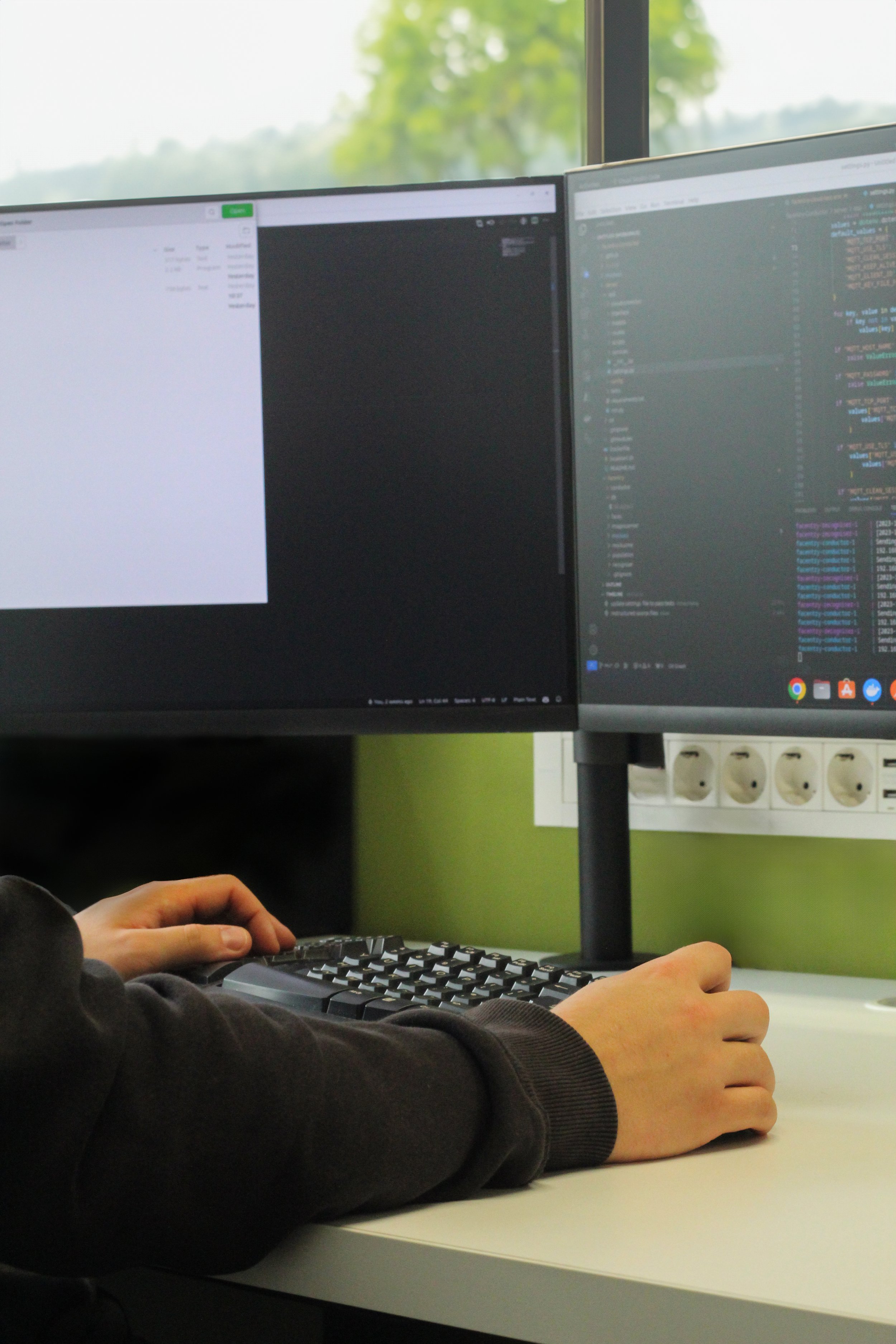Grow your Own - Supporting Apprentices within the Cornish Ecosystem
Growing your own talent. What does it really mean?
To us, it’s about passing the baton, and not just in a performative way.
It’s about striving to create genuine and authentic opportunities for the next generation of ‘us’; be it graphic designers, wordsmiths, software engineers or CEO’s.
Ollie is our Junior Software Engineer, who is working with us alongside completing his Apprenticeship with Truro and Penwith College.
We know talent when we see it, and honestly? It really excites us. With the right jockey, you’re in with a good chance of winning the race.
When a young individual like Ollie comes along, naturally, we can’t help ourselves but support, enable, push and encourage them, not only to get invested in the race and reap the rewards, but also to enjoy the learning process.
Often, the right young talent doesn’t even need the pep talk – they can already taste the finish line, and they’re raring to go, well before the starting blocks.
That’s Ollie Elwell-Deighton.
Ollie is our Junior Software Engineer, who is working with us alongside completing his Apprenticeship with Truro and Penwith College.
Ollie, talk to me about studying and working at the same time. What do you feel the benefits are of working as an apprentice?
Personally, I’ve always enjoyed learning practically. I find it much easier to develop the skills I am being taught if I’m using them actively. An apprenticeship has been perfect for my development, as it has provided me with the opportunity to learn on the job.
For me, doing an apprenticeship has been much more rewarding than traditional classroom education, not just through the financial reward of getting paid, but due to the fact as an apprentice you can see the contributions you provide at work having a positive impact on the business, and actually making a difference.
Ollie says that an apprenticeship has been perfect for his development, as it has provided him with the opportunity to learn on the job.
Can you tell me about the breakdown/split between time spent in college and in the office, working with us?
Every week I spend four days in the office, and one day at college. This gives me a balance between actively getting involved in projects at work, with my own responsibilities over certain tasks, while still allowing me the time to learn new skills at college, which I may not be delving into at work.
Having a day at college is also valuable as it provides an opportunity to network with the other apprentices and learn about what they are working on, to increase my understanding of software development in areas I don’t get into at work.
Your journey is starting as an apprentice with us; where do you see yourself heading in the next few years?
I would like to carry on working for TouchByte, and continue to develop my ability and knowledge of software engineering. Hopefully I will reach a point where I have the ability to lead my own team and co-ordinate projects. I’m very excited for my future with this company.
What advice would you offer to other young people considering an apprenticeship as the next step forwards?
Do it! If you are like me and enjoy working and learning on the job, it’s a great way to get into the industry and learn from people who have had years of experience.
I believe that is something you cannot get through traditional education, which focusses far more heavily on exams and theoretical knowledge.
Supporting Ollie, and many other students through their chosen careers pathways, is Richard Cotton.
Richard joined Truro and Penwith College Business in 2020 after 20 years with another provider, and is the Business Partnership Consultant for Digital & Computing, as well as a lecturer within the Maths & Computing department.
Richard, can you talk to me about your day-to-day role?
I am a former Corporate Lead in IT, and after coming from industry, have spent the past twenty-five years teaching.
I divide my time between teaching on various Digital and Computing FE and HE courses, as an advisor for our IT apprentices, and as the Business Partnership Consultant.
As a BPC, my job is to foster good relationships within the industry, so that we are able to respond quickly to meet training needs and gaps within Cornwall. This could be in the form of apprenticeships, or bespoke technical training.
As a training advisor, my role is to be the liaison between the apprentice and the college, measuring what the apprentice has studied, completed in terms of their evidence requirements, as well as looking after their wellbeing whilst at college through a bespoke tutorial program.
Let’s focus on apprenticeships specifically; why are they so beneficial to young students like Ollie?
For a lot of students, a strictly academic route into their chosen profession does not reflect their chosen career or help with their favored learning style. We aren’t all academics!
For certain professions, apprenticeships are the best route toward their end goal, such as engineering, electrical installation, hospitality, hairdressing and plumbing. The same can apply for some careers in the Digital and STEM field.
The IT industry values its own certifications and qualifications from industry leaders such as Microsoft, Cisco and CompTIA. We try to encompass these qualifications and training within our delivery where possible, to give our students added value and opportunities to gain additional certifications.
Some students thrive in a working environment, learning from a combination of business focused tasks, as well as the theory, backed up in our lessons at college. Other students might not be able to afford to leave home for Higher Education, and this should not block their progression into rewarding and valuable careers – this is why apprenticeships are crucial.
For other students, an apprenticeship can provide a way out of a job that they no longer enjoy, instead choosing a path that improves the opportunities available to them.
Apprenticeships aren’t just for young students, as they are also available to existing employees. We have students who are well above forty, but are using the apprenticeship to upskill and change careers. Apprenticeships build a culture of professional development and life-long learning, as technical roles in particular are ever-changing, and require building on your existing skills and abilities.
What would your advice be to those considering an apprenticeship as their next professional pathway?
I would always suggest that students take advantage of the free education in the UK, until they hit eighteen (unless their chosen career would normally start at an apprenticeship at Level 2), as if they can complete their Level 3 qualifications to earn UCAS points, this gains them entry to a variety of options, including university, with a myriad of courses available.
This time spent at Level 3 supports the young person to mature, learn the responsibilities required for work, as well as helping them to gain valuable employability skills, which are essential for valued and effective employees.
We’re also looking at offering Higher Apprenticeships, where students can gain Foundation or Full Degrees via the apprentice route. This way, they don’t burden themselves with large academic debts, and benefit the business while they are undertaking their training. The business can then also develop the apprentice with the skills and qualities they require, instead of having to recruit for the role later on down the line.
How do apprenticeships support the Cornish Business Ecosystem?
Cornwall has a burgeoning and exponentially growing tech industry. While this is excellent for the sector and county, it can prove an issue when it comes to recruitment, as businesses need staff to grow. Another issue this presents, is that businesses often have to recruit or buy in staff from out of county, at a great expense to facilitate this.
The opportunity is there for businesses in Cornwall to “grow their own” employees, to make sure that these employees are effective and at the heart of the business from the day they are employed. This aids the apprentice in feeling wanted, appreciated and valued, and is therefore more likely to remain with their employer after the duration of their apprenticeship.
Additionally, with the current cost of living, apprenticeships give a more accessible route into higher level skills and careers, which would traditionally require university attendance, without the huge financial burden placed on the apprentice.
For example, our new software engineering degree has been developed in consultation with Cornish Businesses, so it contains various optional modules centred around developments that a business might specialise in, such as Artificial Intelligence and Machine Learning or Data Analytics and Big Data. This is delivered over a two-day period, so that students can attend while working, to study and gain valuable new skills required by businesses.
We have businesses who have taken on Level 4 Apprentices, and also use the new ‘T Level’ courses at college, which require students to undertake over 315 hours of a work placement within a company, per year. This works in a sort of “try before you buy” style, so that at the end of a Level 3 course, employers can then enrol their students onto a Level 4 apprenticeship. This cuts out expensive recruitment and time costs, and the apprentice begins their position with an understanding of the business, it’s values and ideals from day one.
We’re delighted to be playing a role in the creation of new jobs through apprenticeships in Cornwall. We’re passionate about retaining local talent within the county and supporting students through their professional career. Much like Richard suggests, we’re proudly “growing our own”, and we’re finding this to be an incredibly rewarding process.
For Ollie, this is the beginning of his journey, and we’re delighted to watch him grow.




